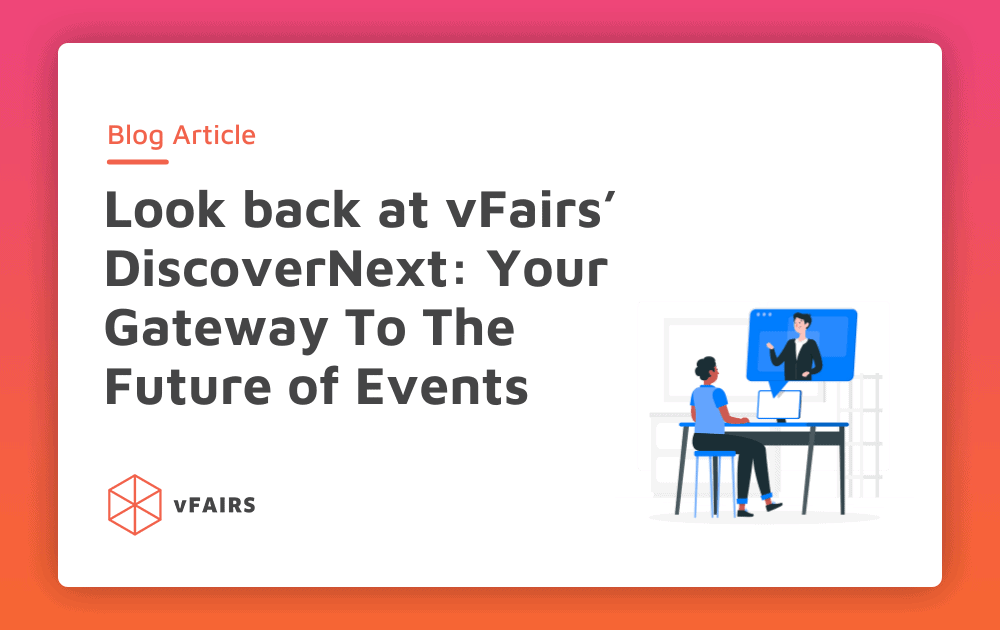After weeks of planning, on September 15th, 2021 vFairs’ DiscoverNext went live to 1100+ eager viewers who wanted to know what the future of events holds. These weeks leading up to the mega event were chaotic and yet so fulfilling for us, as we set up our virtual event platform for you.
vFairs DiscoverNext simply put is the gateway to the future of events. It focused on what lies ahead for the events industry given how the world is rapidly evolving and adapting. Over the past year or so, vFairs virtual events have impacted many industries. Be it the education industry, the corporate sector, or even government associations and agencies, we are proud to say we have served a wide audience with a solution for everyone. However, there is still some skepticism about where the industry is headed, and this event tackles that very question.
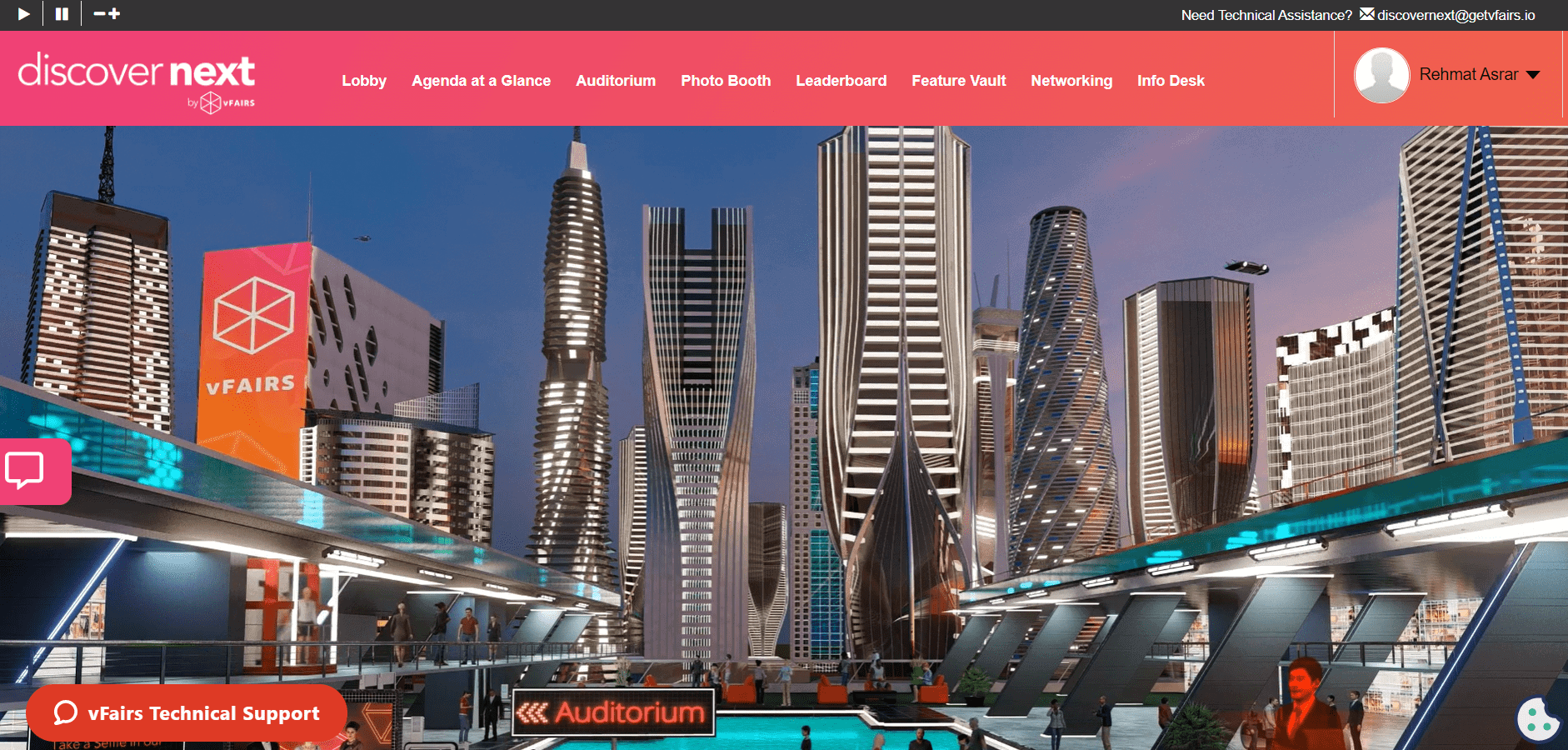
We were joined by speakers representing our loyal and loving customers from each industry. They had a world of insights and reflections from their experience of not just working with us, but hosting virtual events during COVID-19. It was nerve-wracking, new, intimidating yet they overpowered it all!
The event was divided into four tracks by industry:
- Corporations
- Universities
- Governments, Non-profits and Associations
- Agencies.
These were carefully chosen because virtual and hybrid events have transformed how these industries plan and host events in unique ways. This format offered an opportunity for many professionals to dive deep into industry-specific challenges and concerns they may be facing.
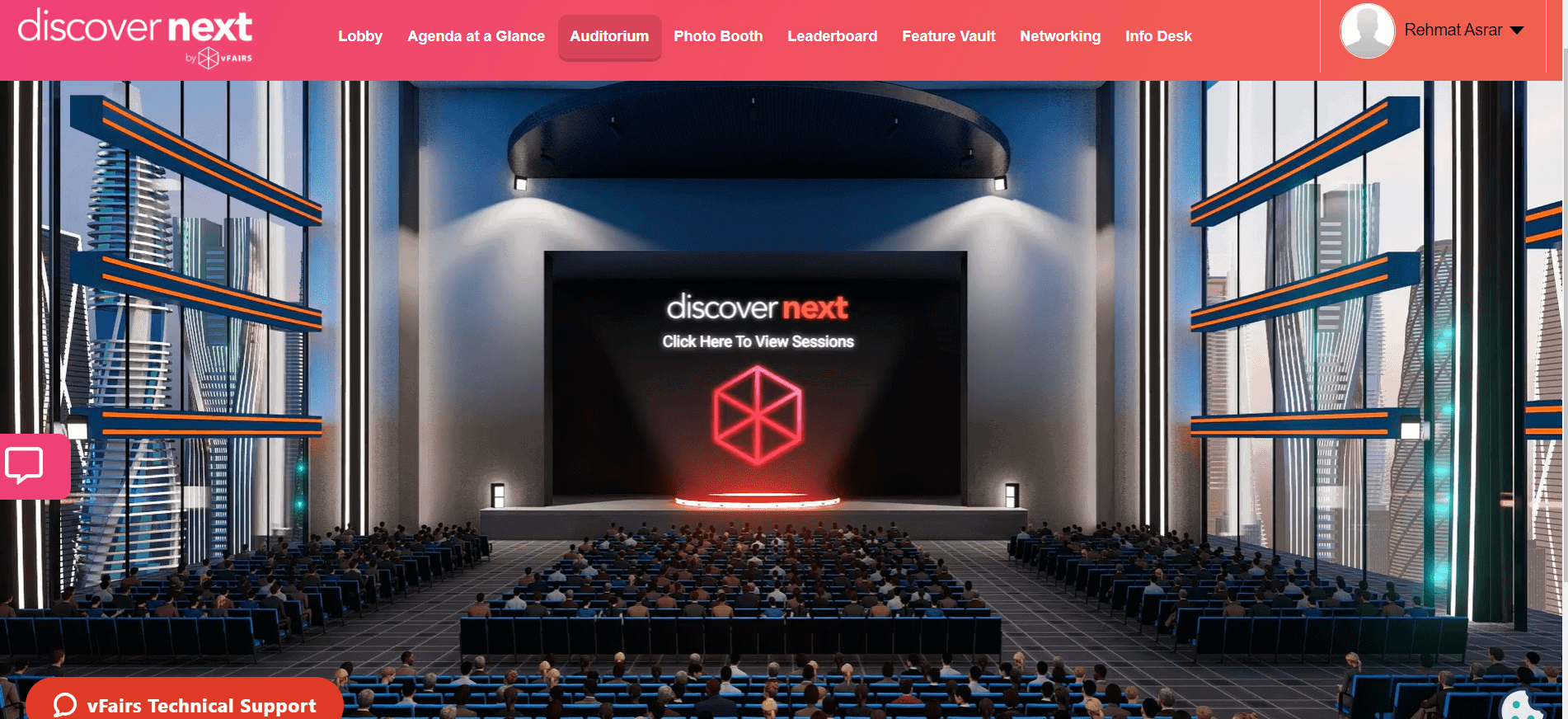
Without further ado, let’s dive right into the event. In case you missed it (we hope you did not), here is what we learned from each track.
Track 1: Corporations
How Companies use vFairs to Engage Top Talent Around the World
Companies around the world are using vFairs to source talent with virtual events. Paolo Tuano from and Marvin Lopez from Tulare County Office of Education offered insights into how they deployed virtual events to achieve their objectives. Although Marvin was already experienced in virtual events having hosted 20+ events in the past 3.5 years, for Paulo it was a new landscape when remote working came about with COVID-19.
Both agree how remote working accords greater flexibility and agility to employees when they are working. This saves time and money. However, knowing when to switch off is a challenge in addition to sharing a collective company experience. If the communication falters, employee engagement falls flat.
Paulo was able to reach Canadians from coast to coast to coast and Marvin too was able to enjoy the increased reach virtual events give.
Key Learnings from Hosting Virtual Events
- Virtual events have changed the hiring cycles of firms. They can host multiple events, instead of being restricted to certain months of the year like before. They allow organizations to recruit people from different parts of the world, or even across larger countries like Canada, since there is no need to travel. Reach and ROI both skyrocket since there is limited expenditures.
- Content is the backbone of your event. What you display to your target audience is key to driving them and having them stick around. Give them visual appeal, video snippets and short messages to make it engaging. It is all about the content you put out there.
Key Advice for Someone Hosting Virtual Events
- Start small. Pilot a small virtual event to get the team comfortable for larger-scale events.
- You cannot just consider hybrid events, you have to add them to your strategy. If you are not planning hybrid events you are not maximizing the potential reach for your brand.
How Companies Are Staying Connected with Customers & Stakeholders in the Post Pandemic World
Derek Berndt, Mary Catherine and Michelle Leyden Li joined vFairs DiscoverNext to discuss how companies are keeping up with customers and other stakeholders in a world that is slowly recovering from COVID-19.
For Derek, the key concern during the pandemic was maintaining that connection with their clients plus keeping engagement with employers and their employees. Alight Solutions was very focused on making sure their clients stay engaged with their employees. An important part of their strategy was to continue interaction without interruption. A torrential year taught his clients the value that virtual events offer.
For Mary as well, Junior Achievements had to reinvent how they deliver their programs. The content and programs had to pivot immediately as well. With virtual events, they were able to deliver their services to 313,000 students, almost 3x of what they were managing pre-pandemic.
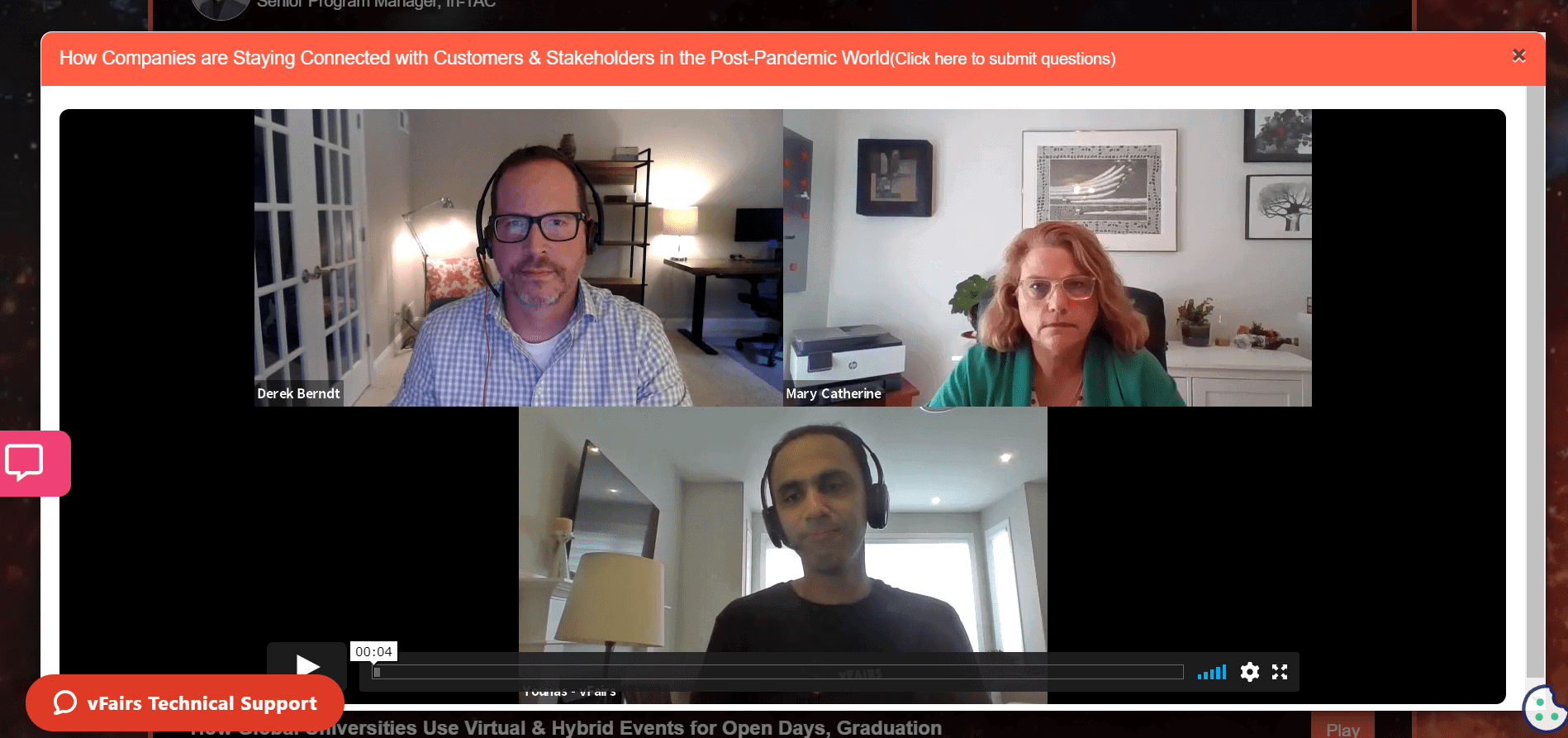
Key Learnings from Hosting Virtual Events
- Solving a problem and coming up with a solution reflect well on your brand. Being able to deliver a high-quality solution says who you are as a brand.
- You can provide attendees a centralized hub of content independent of geography. Your virtual platform is an ongoing source of content and information. This allows more people with otherwise packed schedules access to that repository of information.
- Condensed content keeps people engaged in addition to real-time feedback surveys and interactive polls.
Key Advice for Someone Hosting Virtual Events
- Consider virtual events, as they are not going anywhere anytime soon. People are getting accustomed to the technology used.
- Start small. You will have your own unique sets of problems to work through. Receive feedback, see what worked and what didn’t and use that information to improve your event.
- Commit resources to the event. You may be working with a great organization with dedicated project management teams, however, you need to have project managers on your side too.
- Think through features and functionalities to determine which ones can be optimized for your event needs, don’t just take all of them.
Track 2: Universities
How Top Universities Offer Networking Opportunities With Employers Using Virtual and Hybrid Job Fairs with vFairs
Virtual job fairs have granted unprecedented access to networking opportunities with employers. These virtual job fairs are not just restricted to people starting out, however, they attract adult learners as well. This gives them an opportunity to network and connect with one another.
Francine Blume, Ann Eastham, Keely Ashman and Robin Gregory all represent prestigious universities that have always felt that although in-person job fairs provide a fruitful experience for the audience, they leave out the international audience. This massively restricts reach and the potential of their events.
They wanted something simple and easy which also mimicked the real-life setting of their job fairs. Once the pandemic hit, they quickly aligned their strategies so they still delivered to their audience. What was a mere option earlier, quickly became a requirement.
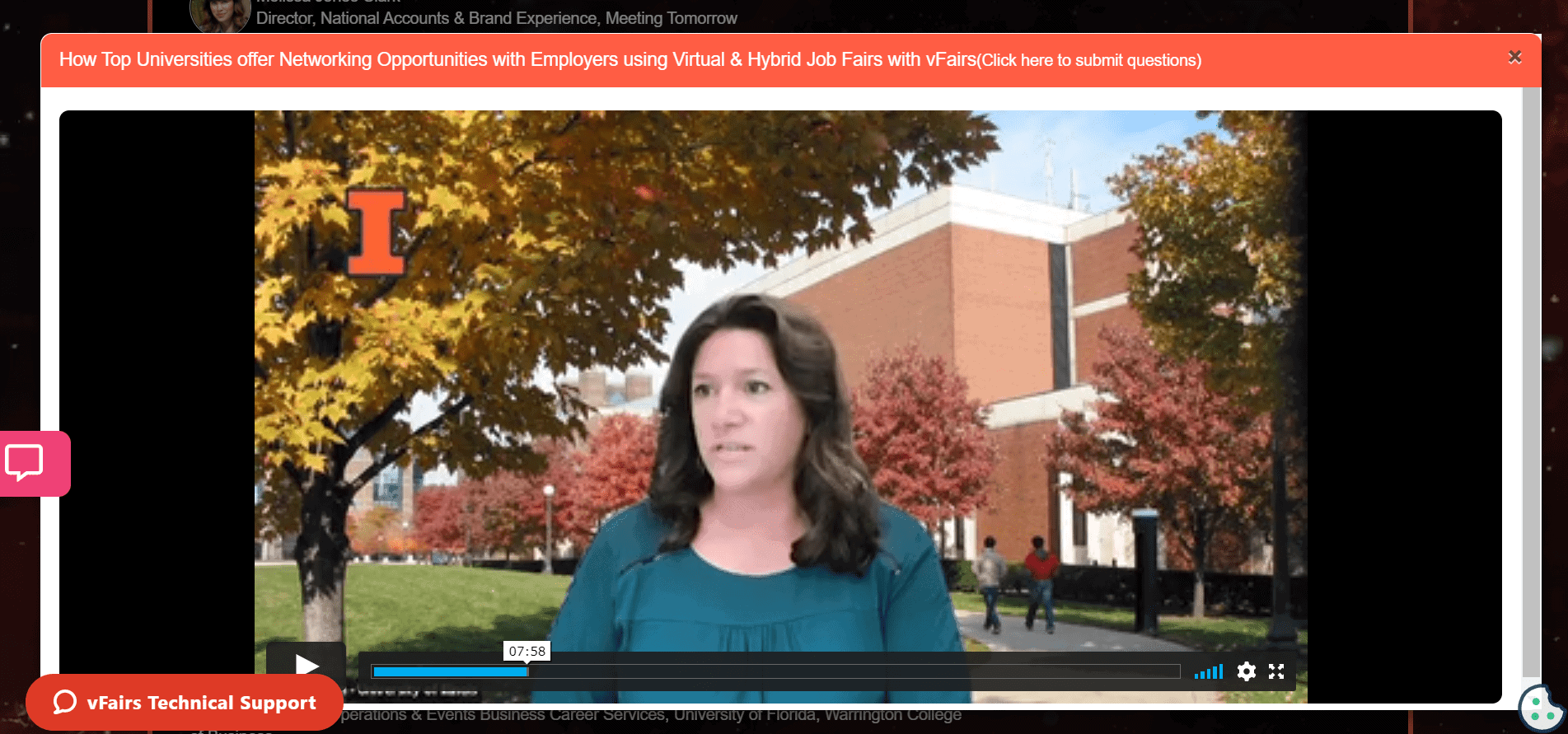
Key Learnings from Hosting Virtual Events
- Students can engage with potential employers and can connect with them even post-event.
- Zoom fatigue is real and so virtual events are a different platform with more functionalities that promise to keep students engaged.
- Virtual events are a huge sell for introverts who are shy and do not wish to stand in line.
- You transgress all printing costs and cleanup times by switching to a virtual swag bag.
- Employers get a better ROI since they are able to reach a wider global audience with a lower overhead cost. You can rank candidates based on performance, and those who do not qualify are given additional support material. This is the power of virtual events, they offer insights that a regular job fair just can’t.
Key Advice from Hosting Virtual Events
- Video chats are more efficient when it comes to job fairs. They allow face-to-face connection which gets lost in a text conversation. Use them.
- Keep your students and employers as informed as possible with the virtual event platform. The platform walk-through gets the employers comfortable, and they know where to go.
How Global Universities Use Virtual and Hybrid Events For Open Days, Graduation Ceremonies And More
For Anitra Douglas and Katherine Cross, virtual events came about organically before the pandemic. On-campus resource fairs and open houses were limited to the people who were nearby. They were missing an opportunity to attract an international audience. Especially when their respective universities had a growing international student population. When they finally pivoted to online events they witnessed the highest attendance.
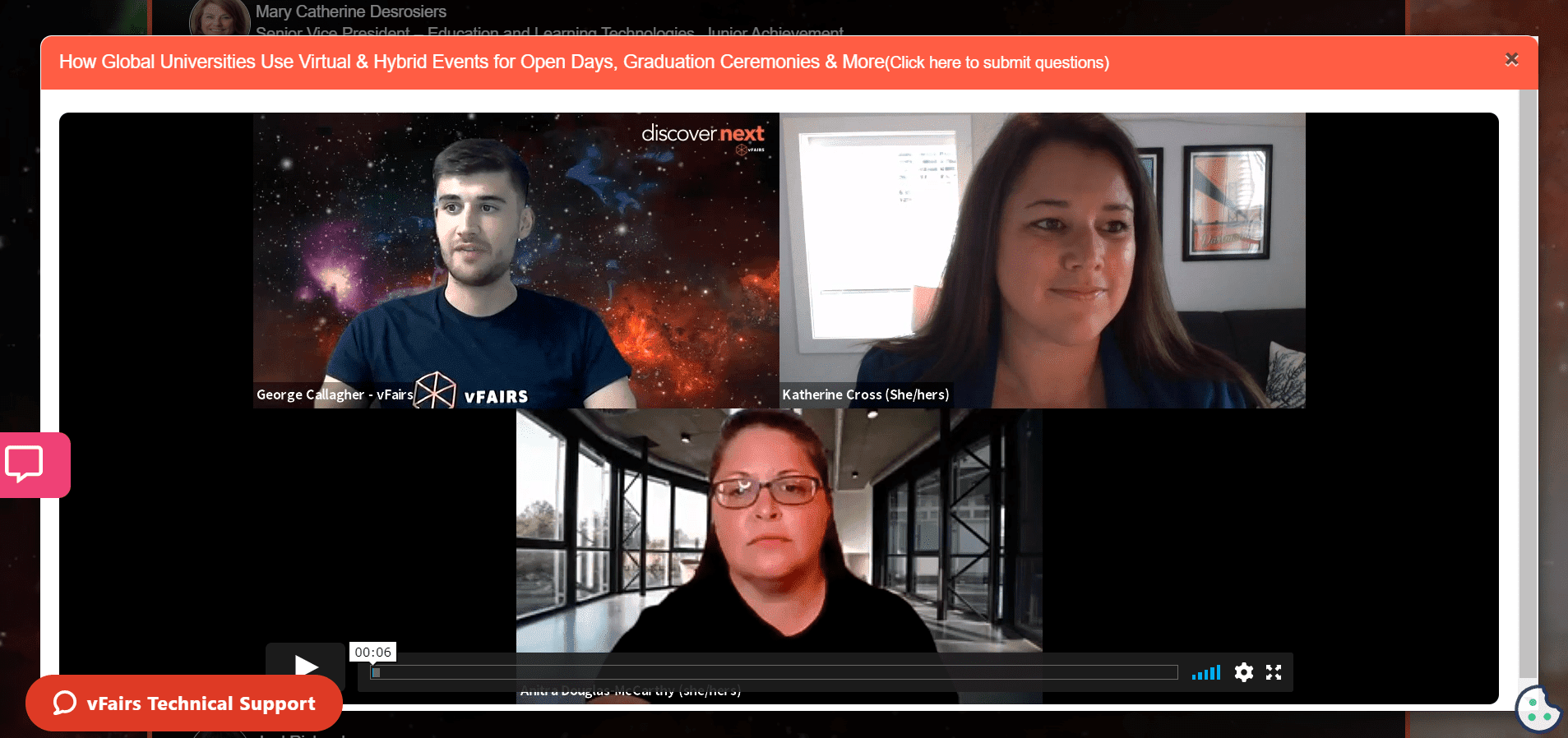
Key Learnings from Hosting Virtual Events
- You’re missing out on talent if you’re not hosting virtual events. These are essential to reach an international population.
- A virtual event gets more people involved in the process, from faculty to students who took more ownership than ever before.
- vFairs’ virtual event platform is highly customizable and you can change them as you go along to suit your needs.
- Hybrid is the future since it gives international students access to your event. Actively consider it.
Key Advice for Someone Hosting Virtual Events
- Be bold and take a leap of faith with virtual events and meet students where they are, since the lines between virtual and reality are blurred.
- Try to get colleagues involved as well for extra help and support.
- Do your homework on the platform. Know what features they offer and which best suits you and your requirements.
Track 3: Governments, Associations and Non-Profits
How Governments, Nonprofits and Associations Build & Grow Thriving Communities with vFairs
We had Anika Price, Jael Richardson, Jasmine Miles, and Kevin Smith share insights into how virtual events were an important part of their strategy. What united them was their drive to keep delivering despite the circumstances. Plus, their commitment to not just hosting events and putting up information, but building and maintaining connections were critical.
Virtual events have also played a vital role in creating equal opportunities for minority populations. They help eliminate barriers for minorities and create a sense of community and connection. Previously, even if they gave out subsidies to support people to attend in-person events, people couldn’t afford to take time away from their families. Now, everyone could since virtual events are widely accessible.
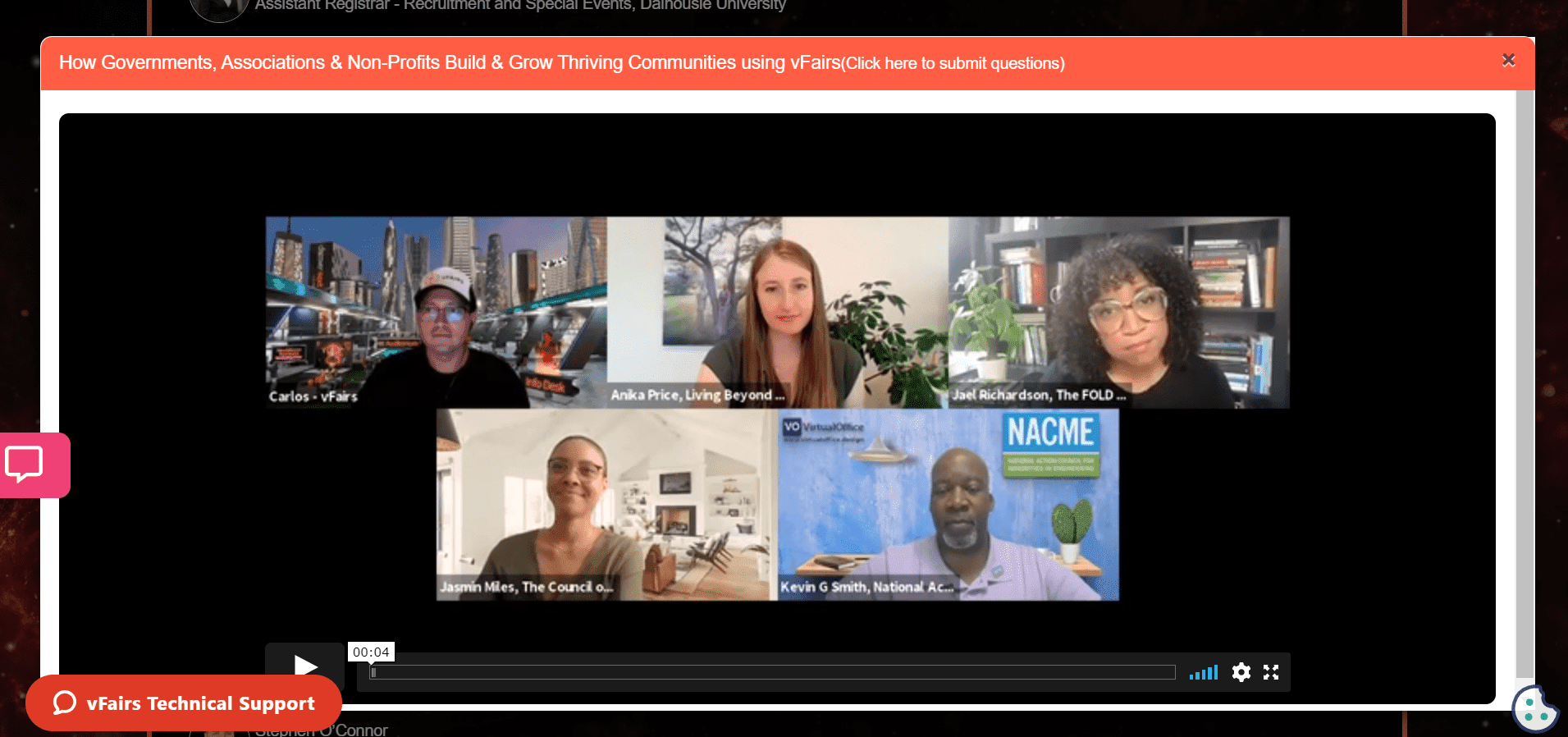
Key Learnings from Hosting Virtual Events
- A new revenue stream was established when they monetized their events by selling tickets, sponsorships and exhibiting space.
- You can use the platform to bring workshops etc. to your member base, without incurring extra costs.
- You get access to speakers as virtual events are flexible, and you do not need speakers to be present physically.
- Leaderboards are a highly valuable component, couple it with scavenger hunts, and they have monetized your event. They help you make your money back.
Key Advice for Someone Hosting Virtual Events
- Define event priorities. If the audience needs a space for conversation, then make necessary provisions for chats and connections. Put chatrooms in the event and within the booths.
- Design a program first and then select the necessary tools and look for customer support accordingly.
How Governments, Associations & Non-Profits Hire & Place Talent using vFairs
Michael Schwoerke, Ying Xie, Danyelle Simmons and Trina Edwards came together at vFairs’ DiscoverNext to talk about vFairs role in helping various associations and non-profits hire and place talent in renowned organizations.
Scalability was the main reason they chose to go for a virtual event, plus when you consider hybrid events they allow you to host events that otherwise wouldn’t be possible in any conference center in the world.
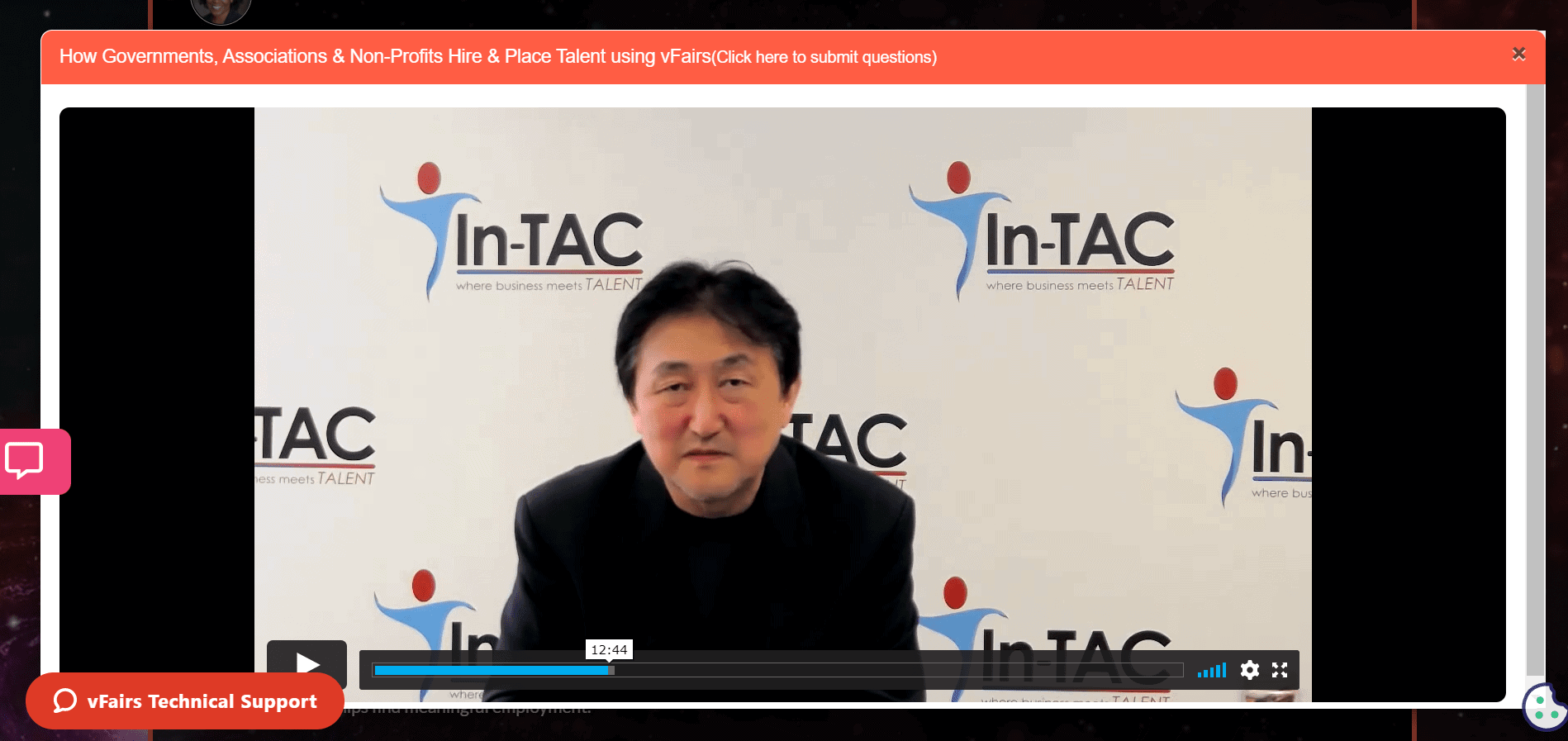
Virtual events have allowed them to take their ROI to an unimaginable level, helping members connect with stakeholders in the same interactive way. Employers can easily access a wider pool of candidates. The easy-to-use back end and the dashboard give a clear picture of the registrations. In addition to that, vFairs exceptional customer service was a popular feature with the panelists.
Key Learnings from Hosting Virtual Events
- Customer service is key. Project managers address all concerns and help you think out of the box.
- Functionality and embedded chat is a great way to interact and network.
- Making resources more accessible to far-away audiences is a big benefit of virtual events in addition to providing resources in the format someone prefers is useful.
Key Advice for Someone Hosting Virtual Events
- Stay true to your brand. There are lots of opportunities for customization which you can use to your advantage and create custom-branded virtual environments, thus boosting your global brand identity.
- Set up your goals prior to, and then find the virtual platform that will help you hit your goals.
- Ask yourself what exactly you’re trying to do. Do you want to focus on recruitment, or brand awareness as well?
- Do your research. Look at the virtual event providers’ case studies, check out what exactly they offer, and make sure you’re very well informed about it.
Track 4: Agencies
How To Make Your Hybrid Event Stand Out With A/V Partners
We’ve stressed on the significance of a sound A/V system and a robust A/V team countless times before. Thus, vFairs’ DiscoverNext would be remiss not to invite Mike Kuntz, Melissa Jones Clark of Meeting Tomorrow and Rob Allen to help us understand the role A/V partners play in delivering a hybrid event.
They gave us some sound advice about not just hybrid events but how to collaborate with the A/V partners. Here you go!
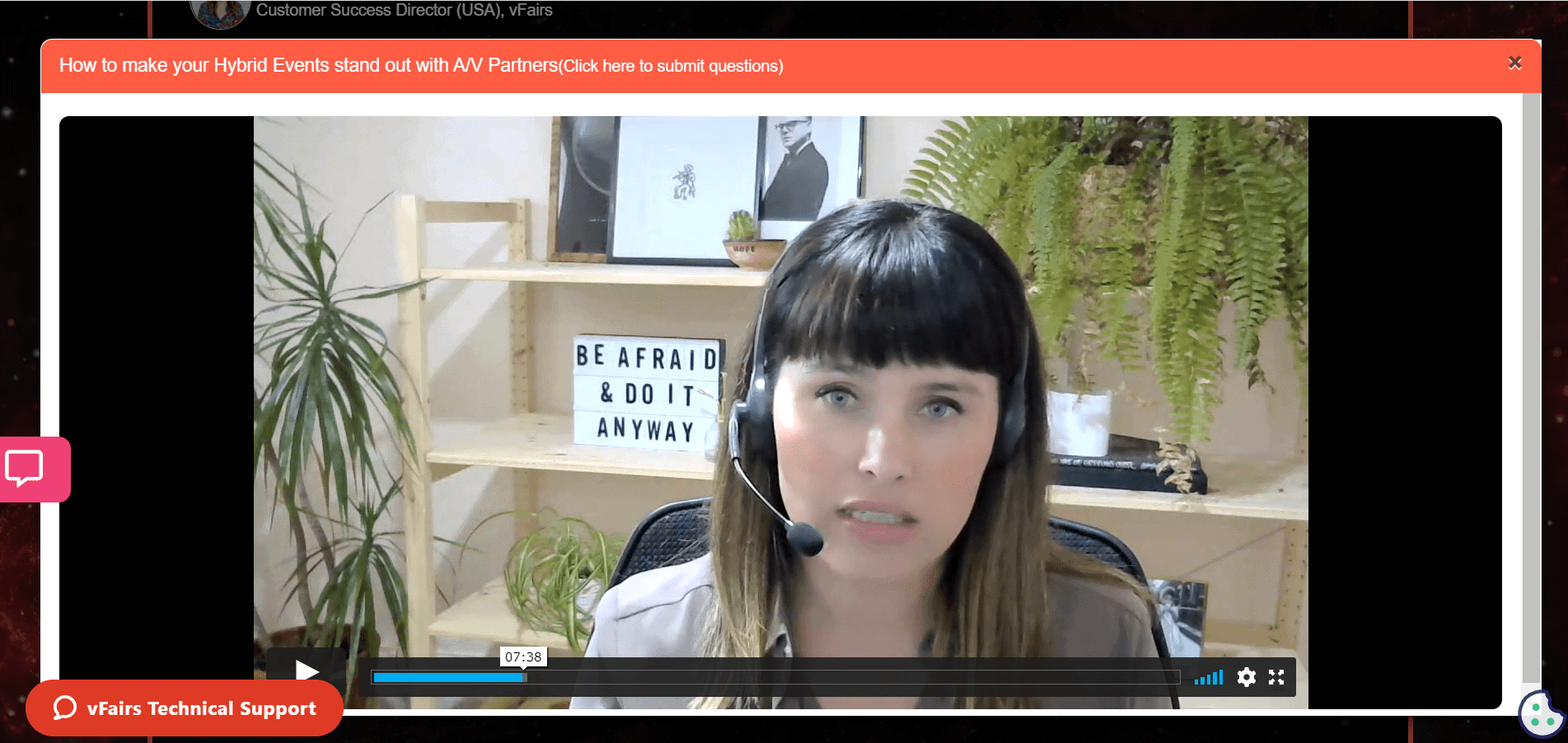
Key Advice for Someone Hosting Hybrid Events
- Run through practice sessions with speakers to make sure they’re prepped and are able to engage the audience.
- Create content that’s easy to consume in your presentations.
- Trust your A/V partner with the production, don’t worry about that yourself. Make sure to pick the right production company. Don’t do it without one. Hosting a show by yourself is stressful, so let them take care of things like run-of-show and production elements, etc.
- Know what questions to ask your A/V partner when planning an event. Don’t hold back as it is a new ground for you to navigate so ask as many questions as you want. Ask them about other events/hybrid events they’ve done so you get an understanding of whether they will be able to handle your event.
- Choose the right team. Get the right producers and project managers. The right salesperson will give you what you are asking for, not what they want to sell.
The bottom line is hybrid is here to stay, and is becoming the new normal. Clients need to spend a lot of time planning what activities they want their virtual audience to experience and what they want their in-person audience to experience. So the more you adapt and explore the better chances you’ll have at making your event a success.
How Agencies Use vFairs to Create Memorable Experiences for Their Clients
It is no secret that vFairs has not just transformed the way organizations interact with their customers, rather they’ve also empowered them to create memorable experiences for them. Stephen O’Connor, Cindy Dodson and Colleen Jamieson reflect on how vFairs has aided their organizations and countless others in creating unforgettable experiences for their clients.
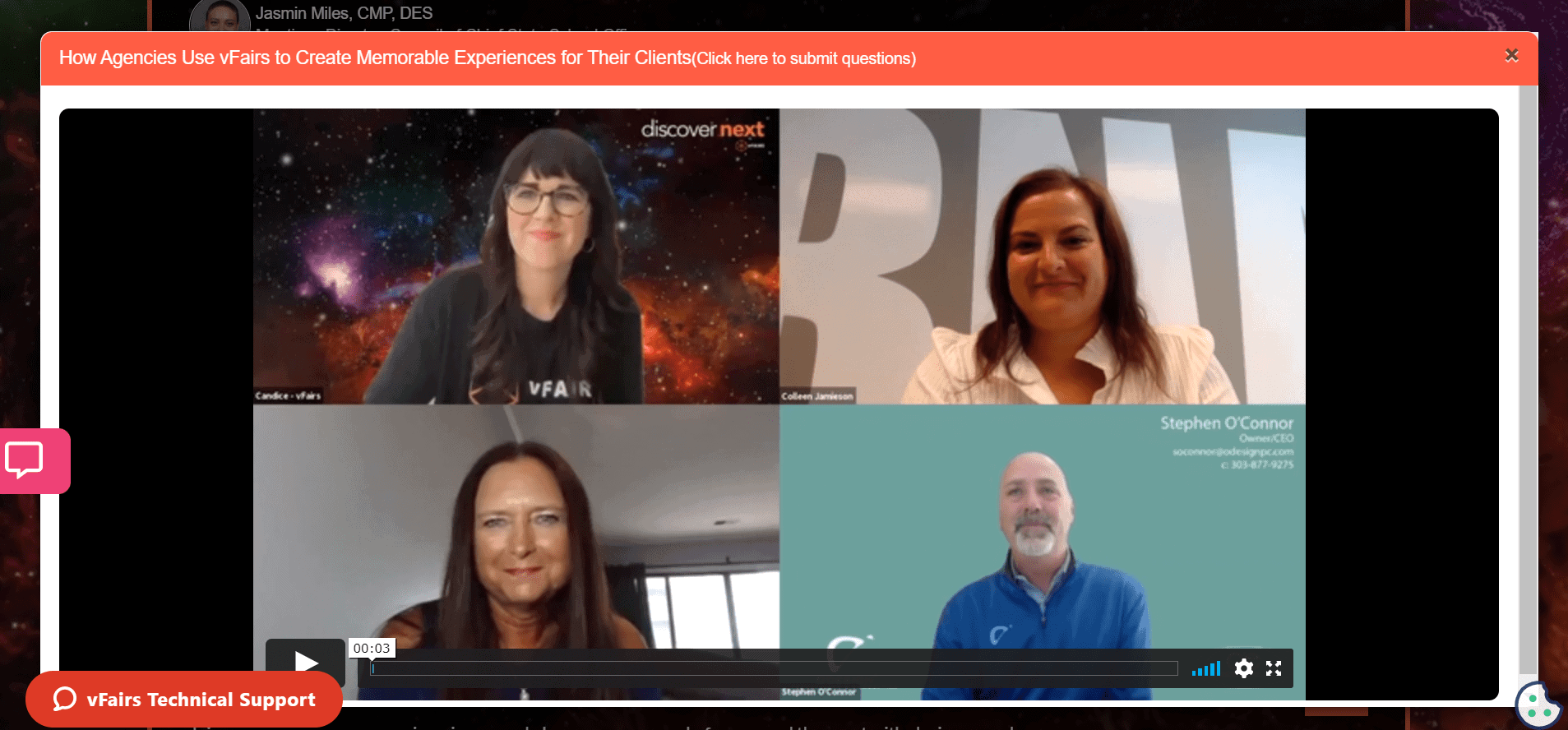
Key Learnings from Hosting Virtual Events
- Look at goals and accomplishments when figuring which event is best for the clients. Take into account the impact of hosting hybrid or virtual events plus budgets, audiences reached and concerns related to virtual products.
- When it comes to sponsorship it is more about adding value for the sponsors and getting them maximum visibility and exposure.
- Flexibility is key. Just as when you plan in-person events we plan for the unknown, we must do the same for virtual events. Expecting to go one way (potentially hybrid or more in-person) with an understanding that we can quickly pivot if need be is a good approach. Having more tools also grants flexibility.
Key Advice for Hosting Virtual and Hybrid Events
- Build the purpose into the center of the events — if the purpose is about networking or learning, see how you can work that into the center and then build out from there.
- Use data and feedback from the virtual events to show the value of your events to your management and stakeholders.
- Understand people’s needs and what might be next in the industry with tools within the platform such as surveys, polls, and event data from the backend.
We don’t know about you but our head is spinning. vFairs’ DiscoverNext gave us so much to learn from these industry experts. You’re basically getting advice from the professionals who’ve been there and done that so best lend an ear to what they’ve got to say.
To learn more about the 2022 event, click here.
Missed vFairs’ DiscoverNext?
Watch On-Demand Sessions Now!
View vFairs’ DiscoverNext Sessions

